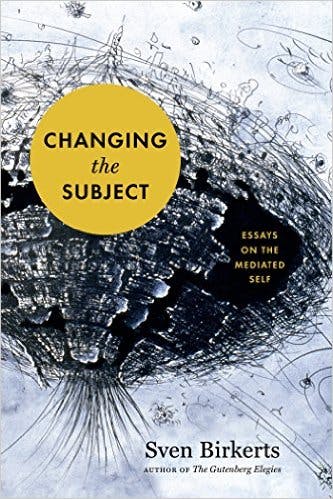By now, it’s happened to all of us, I suppose: learning about a friend’s death on the Internet:
I was vacationing, away from cities, and had not really expected to have Internet access—had indeed, been looking forward to not having it—but wires go everywhere these days, and the will to cut oneself off voluntarily is weak. So it was via an email that I learned... There was something from my poet friend Peter... When I opened the e-mail and saw there was no message, just a link, I clicked. And then all at once I was awake and trying to take in what I was reading. Seamus Heaney was dead. Seamus was dead.
News of Seamus Heaney’s death comes near the end of Sven Birkerts’s thoughtful, measured and provocative collection of essays, Changing the Subject: Art and Attention in the Internet Age. The news comes as a kind of crowning blow. By the time Birkerts relays it to us, we can see that he associates the death of his friend with the technology that delivers the news. Birkerts’s subject throughout the book is almost as momentous and as hard to comprehend as the unexpected death of a friend. What comes crashing through all our screens is loss: not just the loss of a friend, but of the powers of concentration that make friendship possible. For Birkerts, concentration is the power and inclination of the mind to set its sights on someone or something (a friend, a work of art) without allowing itself to be distracted by what George Eliot describes as “that tempting range of relevancies called the universe” (Middlemarch). It underwrites not just friendship, but every kind of connection (as opposed to connectivity) that makes our lives worth living.

Birkerts has written with perspicacity and prescience about the effects of the electronic media on our powers of concentration, most notably in The Gutenberg Elegies. This time, though, it’s personal—or more so, anyway. As the web has reaches more deeply into the intimate spheres of our lives, it seems fitting that Birkerts’s account of its effects should be more personal, too. The essays in Changing the Subject are about the effects of the new technologies of communication on the ways we love and on the ways we read, and about how the ways we love (or fail to) can’t really be separated from the ways we read (or fail to).
Of course, there is reason to believe that people have been easily distracted for a long time. “When a man knows he is to be hanged in a fortnight, it concentrates his mind wonderfully”, Doctor Johnson famously declared in the 1770s, by which he doesn’t exactly mean to suggest that it requires the threat of imminent death to make us concentrate—but something close enough. And as everyone knows, while it may have always been hard to settle down and concentrate on the here and now, it’s much harder to be “here and now”, here and now, what with all the bells and whistles, the bright lights and ring-tones of modern technology—“technology stains the moment with its disconcerting transmission of elsewhere.” “[T]he digital realm” doesn’t “foster”, even “allow” “calm, linear, reflective thinking”. Birkerts writes:
The Internet… is the instrument par excellence of lateral connection. That is its power and its glory, the fact that our search engines can retrieve and link materials in an eyeblink and then lure the blinking eyeball on to the next thing, and the next. For everything connects, and in the digital realm the eyeball is always moving.
We all know the state of distraction that Birkerts illuminates here, the listless march of the eye dictated by “our devices”, those screens that ceaselessly draw us away from the faces and pages right in front of us, and from the depths that those faces and pages contain; march us away from the more arduous adventures involving the long arcs of attentiveness required by the novels of Tolstoy and Joyce; call us away from what will come only if we allow ourselves to linger over a line without any thought of clicking on to the next link.
And by now, we all know the fear that our powers of concentration are in danger of being lost forever. This is Birkerts’s “deeper dread”: the possibility that those parts of our brains “that support calm linear thought” are becoming extinct, along with the parts of our culture that once encouraged, even required “calm linear thought” as well as all other forms of concentration. I can’t imagine anyone, especially anyone old enough to remember life before the Internet, who doesn’t feel some version of Birkerts’ “deeper dread”. It doesn’t take a neuroscientist to know that once you give up certain powers of the heart and mind, you never get them back.
By now, the screeds against screens are as much in our faces as the screens themselves, and Birkerts’s quiet jeremiad might be lost in the chorus of nay-sayers. That would be a shame. Unlike many of the complaints that have been lodged against the Internet, there is no shouting in Birkerts’s thoughtful indictment. Birkerts is worried, but he is not nervous. He is vexed, but he is not outraged. He speaks of the possibility of “quiet[ ing] . . . [his] inner Cassandra”, but what makes his inner Cassandra such an effective messenger is that she is quiet enough, well tempered enough to win the ear of even the most dedicated denizen of the internet, or as she or he might prefer to be called, citizen of a virtual public sphere:
I can’t believe most of us don’t have our moments, when we find that we are not necessarily convinced by the chirpy ad-speak ethos about “progress”, when we concede that the top-to-bottom reengineering of our lives might hold drawbacks as well as advantages
I can’t believe it either. Birkerts’s critique is compelling in large part because it is moderate. What he asks us to admit is what any honest, reasonable and reasonably sensitive observer of the digitalized ways we live now must admit. Whatever gains the Internet has provided have come at a cost.
For all of his moderation though, Birkerts appears disinclined to admit that anything good can come out of the Internet, or even survive it—anything at all. As a result, he can sometimes wind up sounding a little like the dark, Manichaean twin of the cloudy group-thinkers whose absolute refusal to entertain any doubts about the effects of the Internet he properly indicts. Searching online for any words worthy of the sustained attention that a novel repays, he comes up emphatically with absolutely nothing:
I read about Prince Andrei dying on the battlefield [in War and Peace] and I am brought to sharpness inside myself. I am given a specific measure of experience and I hold it alongside mine, and when I mark the page and close the covers I am as full of my own singular sense of existing as I have ever been. I have not found that—not even a hint of it—in my online reading” (stress added).
But there are hints on the Internet of the elevated experience that Birkerts describes here, the Romantic affirmation of one’s singular existence that arises out of an act of concentrating on the existence of someone else. There is evidence of this higher life to be found even on the Platforms of the Internet, if you are inclined to find it.
To take up the search where Birkerts abandons it, I want revisit briefly the death of another prince, not of Prince Andrei, but rather of someone who by all accounts, was another kind of Prince among men—Seamus Heaney: “Seamus”. Birkerts calls him by his first name, he tells us “because we were friends. Not best friends—he had various true intimates—but real friends”. Birkerts’s characteristically careful qualification of claims (in this case, about just how close he was with Heaney) puts me in mind of Hawthorne’s famous counsel to authors about how they might best imagine their audience:
as thoughts are frozen and utterance benumbed, unless the speaker stand in some true relation with his audience—it may be pardonable to imagine that a friend, a kind and apprehensive, though not the closest friend, is listening to our talk; and then, a native reserve being thawed by this genial consciousness, we may prate of the circumstances that lie around us, and even of ourself, but still keep the inmost Me behind its veil (“The Custom House”, The Scarlet Letter)
The partial kind of closeness that defines the relation between writer and reader as Hawthorne would have it: doesn’t it sound a little like Birkerts’s friendship with Heaney: “Not best friends—he had his various true intimates—but real friends”? And don’t they both sound a lot like relationships that writers have cultivated with readers for a long time now, and which many readers and writers have developed on the Internet, over the course of many years? Such relations are not the same as face-to-face friendships, but they may well resemble some of their best parts, and those relations may rise in their wake, like the souvenir of some lost intimacy, some lost time: they may be like, to invoke one of Birkerts’s titular genres, an elegy for those lost objects of affectionate attentiveness, of enduring, endearing concentration.
For many of us, the Internet has come to be principally a site not of blur-eyed distraction, but rather a place where we can focus on friendships like the one that Hawthorne proposes, friendships whose course and character are often fundamentally elegiac. (One of the main things we talk about with pretty good friends is the loss of those who were dearer to us.) On a personal note, when I write on the Internet (and I do so a lot—indeed, once a day), I am usually trying to communicate with a constellation of loved ones that I have lost, through carelessness or something more or less culpable than carelessness. The friends that I am trying to reach (and know that I mostly never will) gather together and converge within a single someone else, a person addressed by a single pronoun—the second person plural. Thus grammatically (but not merely so) I am usually concentrating on just one person when I write, a pronominal Prince who represents the princely multitudes I just mentioned, as well as people I may know now or sometime in the future. I am usually trying to write to you.
